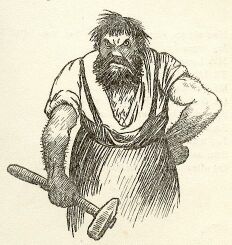Gale is a surname. Notable people with the surname include:
Ziegler is a common German-language surname meaning "brick-maker" and may refer to the following people:
Vogel and De Vogel are surnames originating in German and Dutch-speaking countries. An alternate spelling is Fogel. Vogel is the German and Dutch word for "bird". Equivalent surnames are Bird or Byrd in English or L'Oiseau in French. Notable people with the surname include:
Henderson is a surname of Scottish origin. The name is derived from patronymic form of the name Henry and Hendry, which is a Scottish form of Henry. It means "Son of Hendry" and "Son of Henry". In Scottish Gaelic it is rendered MacEanraig (masculine), and NicEanraig (feminine).
Thorne is a surname of English origin, originally referring to a thorn bush. Thorne is the 1,721st most common surname name in the United States.[1]
Frey is a surname of German origin, from the Middle High German word "vri," meaning "free," and as a name, it referred to a free man, as opposed to a bondsman or serf in the feudal system. Other variations include Freyr, Freyer, Freyda, Freyman, Freyberg, Freystein, Fray, Frayr, Frayda, Frayberg, Frayman, Freeman.
Schneider is a very common surname in Germany. Alternative spellings include: Schneyder, Schnieder, Snyder, Snider, Sneider, Schnyder, Znaider, Schnaider, Schneiter, Shneider, and Sneijder, Snijder (Dutch), Snither (English), Snyman (Afrikaans), Schnider, Sznajder, Szneider (Polish), Snaider, Šnajder (Serbo-Croatian), and Schneidre (French).
Hobson is an English patronymic surname. Originating in Scandinavian Denmark, the surname found its way to England and Iceland during the Anglo-Saxon (450-1066) and Viking (793-1066) eras, evolving from Son of Hrod (Hróður) to Hobson. The name reaches its highest concentrations in Yorkshire, Lincolnshire and Cambridgeshire.
Kent is a surname. Notable people with the name include:
Leonard or Leo is a common English masculine given name and a surname.

Rachel, meaning "ewe", is a feminine given name of Hebrew origin, popularized by the biblical figure Rachel, the wife of Israelite patriarch Jacob.
Wallace is a Scottish surname stemmed from the Anglo-Norman French Waleis "Welshman". It is a northern variant form of Gualeis "Welshman" ; adjectiv gualeis "Welsh" ; same as walois "the oil language".
Lang is a surname of Germanic origin, closely related to Lange, Laing and Long, all of which mean "tall".
Horne is a surname. Notable people with the surname include:
Vera is a female given name of Slavic origin, and by folk etymology it has also been explained as Latin vera meaning "true". In Slavic languages, Vera means faith. The name Vera has been used in the English speaking world since the 19th century and was popular in the early 20th century. In Turkish Vera means piety.

Faber is the Latin word for "smith". Like a few other Latin occupational names, it was adopted as a surname in the Low Countries and Germany. It is also common in England, perhaps due to Norman French influence. Notable people with the surname include:
Beer is an English and German surname. Notable people with this surname include the following:
Curtis or Curtiss is a common English given name and surname of Anglo-Norman origin, deriving from the Old French curteis which was in turn derived from Latin cohors. Nicknames include Curt, Curty and Curtie.
Quinn is an Anglicised form of the Irish Ó Coinn or Mac Cuinn. The latter surname means "descendant of Conn". The surname Quinn is also rendered Ó Cuinn or Mac Cuinn in Irish. The surname is borne by several unrelated families in Ireland, especially in the northern province of Ulster and also the counties of Clare, Longford, and Mayo. According to the historian C. Thomas Cairney, the O'Quins were part of the Conmaicne Rein tribe in Ireland who came from the Erainn tribe who were the second wave of Celts to settle in Ireland from about 500 and 100 BC. The most notable family of the name are that of Thomond, a Dalcassian sept, who derive their surname from Niall Ó Cuinn who was slain at the Battle of Clontarf in 1014. This family was formerly represented by the Earls of Dunraven. Another family is that seated in Annaly, who were related to the O'Farrell lords of Longford. Another Quinn family was seated at An Chraobh, County Tyrone and they were related to the O'Neill Kings of Tír Eoghain and for whom they acted as Hereditary Quartermasters. Other families include one seated in Antrim; one seated in Raphoe; and one called Clann Cuain, seated near Castlebar. In the seventeenth century, the surname Quinn was common in Waterford. In 1890, the surname was numerous in Dublin, Tyrone, Antrim, and Roscommon. Quinn is one of the twenty most common surnames in Ireland. the surname Quinn is sometimes associated with Catholics, while Quin is associated with Protestants.


